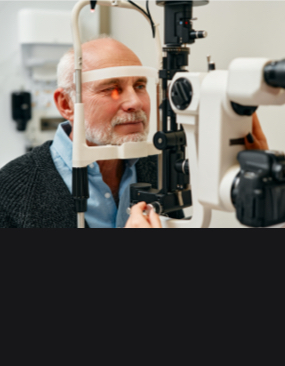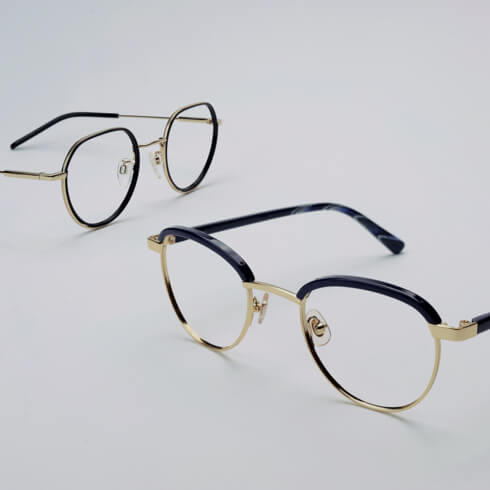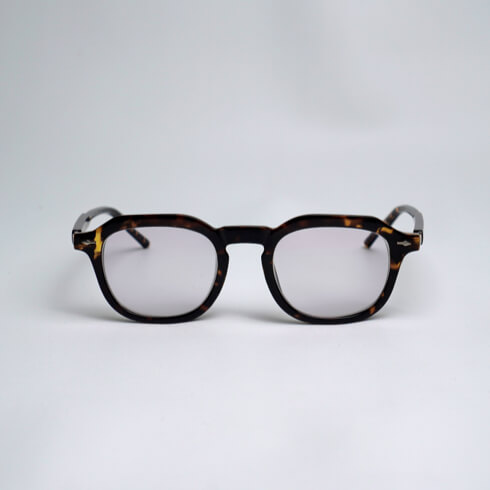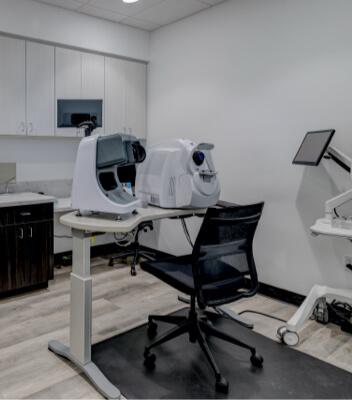
Myopia, also known as nearsightedness, is an eye condition affecting people worldwide, and many wear corrective lenses to correct this issue. Proper management can help you to see clearly, but what are the risks if your myopia is left untreated?
Untreated myopia can significantly increase your risk of several serious eye conditions. Continue reading to learn more about the long-term health concerns for untreated myopia.
WHAT IS MYOPIA?
Myopia is a common eye condition affecting nearly 30% of the U.S. population. This condition causes nearby objects to appear clear while farther away objects are blurry and difficult to see. The shape of your eye causes light to refract improperly, causing visual problems.
Myopia is often noticed at an early age, and a child’s symptoms can include:
- Persistent squinting
- Frequent eye rubbing
- Sitting closer to screens
- Seeming unaware of distant of objects
- Excessive blinking
Symptoms of myopia in adults may include squinting, blurry vision, headaches, and difficulty seeing when driving. Diagnosing this condition is crucial to protecting your vision as there are several variants, and some can increase your risk of long-term health concerns. The types of myopia include:
SIMPLE MYOPIA
Simple myopia is the most common form of this condition. All refractive errors are measured in units called diopters. Simple myopia is typically between -0.25 to -3.00 diopters and does not increase a person’s risk of additional eye conditions.
HIGH MYOPIA
High myopia is a more severe form of the condition. It typically occurs when someone develops myopia in childhood and it continues to progress as they age. This variant is greater than -5.00 to -6.00 diopters.
High myopia can increase your risk of developing eye conditions such as retinal detachment, glaucoma, and cataracts.
DEGENERATIVE MYOPIA
Degenerative (or pathological) myopia is a rare form of myopia affecting roughly 2% of the U.S. population. It is usually inherited from your parents and causes rapid myopia progression in the teenage or adult years. This variant can increase your risk of detached retinas, abnormal blood vessel growth, and glaucoma.
A comprehensive eye examination can diagnose any conditions you may have and provide you with a treatment plan. When myopia is not managed, several concerns can have a serious impact on your ocular health.
HEALTH CONCERNS FOR UNTREATED MYOPIA
Blurry vision is not the only worry with myopia, there are risks involved when this condition is not properly treated. With severe forms of myopia, there is an increased risk of developing several eye conditions. Some of these long term concerns can include:
GLAUCOMA
Glaucoma describes a group of conditions that can damage the optic nerve. This damage is typically caused by pressure building within the eye, but there are variants of glaucoma that do not cause an increase in ocular pressure.
Many types of glaucoma have almost no warning signs, and you may not notice any differences in your vision until the advanced stages. This condition can lead to blindness if left untreated. Visit your optometrist if you experience any of the following:
- Blind spots in your vision
- Severe headache
- Eye pain
- Blurred vision
RETINAL DETACHMENT
Retinal detachment is an emergency where the retina at the back of your eye pulls away from its position. When this detachment happens, retinal cells are separated from the layer of blood vessels providing them with oxygen and nourishment.
Your risk of permanent vision loss increases the longer retinal detachment goes untreated. There are several warning signs of this condition:
- A sudden appearance of floaters
- Flashes of light in one or both eyes
- A curtain-like shadow over your vision
- Blurred vision
CATARACTS
Cataracts are the clouding of the lens in your eye. This condition can cause your vision to seem as if you are looking through a foggy window, and this can affect your everyday life. Progression is gradual and you may not notice any difficulties at first.
If your vision becomes heavily impaired, cataracts surgery may be recommended. You should see a doctor if you experience any of these symptoms:
- Double vision
- Flashes of light
- Sudden eye pain
- Sudden headaches
QUALITY OF LIFE
While not as serious as other concerns listed above, your quality of life can be impacted by untreated myopia. Besides difficulty seeing, you can experience frequent headaches and eyestrain which can affect your everyday life.
Myopia is not only a refractive error affecting your vision, it can have serious implications for you or your child’s ocular health. This condition can increase the risk of several different eye conditions, but through proper management of this condition, you can prevent or reduce these concerns.

MYOPIA MANAGEMENT
Myopia typically develops in childhood and can become more severe as they grow older. This can cause them to be dependent on heavy prescriptions in adulthood, but there are ways to manage myopia in children to slow progression.
With management, you can slow or even stop the progression of myopia in your child. Myopia management is more effective the younger it begins, and some common methods of myopia management can include:
- Overnight contact lenses
- Daytime soft contact lenses
- Prescription eye drops
MYOPIA MANAGEMENT IN ADULTS
This management may not be useful for adults though. Growth is a factor in the progression of myopia and by adulthood, your eyes do not change as much and your myopia will likely stabilize. For adults, regular eye examinations are vital to ensure your eye health and vision.
There are several treatments for myopia in adults. Eyeglasses and contact lenses are common solutions for this condition, but laser eye surgery can be effective as well. Your optometrist can recommend the best solution for you.
KEEP YOUR EYES HEALTHY
If you or your child are experiencing any symptoms of myopia, request an appointment with your optometrist. Leaving this condition untreated can cause complications, and regular eye examinations can ensure your eye health and vision.
 Myopia, also known as nearsightedness, is an eye condition affecting people worldwide, and many wear corrective lenses to correct this issue. Proper management can help you to see clearly, but what are the risks if your myopia is left untreated?
Myopia, also known as nearsightedness, is an eye condition affecting people worldwide, and many wear corrective lenses to correct this issue. Proper management can help you to see clearly, but what are the risks if your myopia is left untreated?
Untreated myopia can significantly increase your risk of several serious eye conditions. Continue reading to learn more about the long-term health concerns for untreated myopia.
What is Myopia?
Myopia is a common eye condition affecting nearly 30% of the U.S. population. This condition causes nearby objects to appear clear while farther away objects are blurry and difficult to see. The shape of your eye causes light to refract improperly, causing visual problems.
Myopia is often noticed at an early age, and a child’s symptoms can include:
- Persistent squinting
- Frequent eye rubbing
- Sitting closer to screens
- Seeming unaware of distant of objects
- Excessive blinking
Symptoms of myopia in adults may include squinting, blurry vision, headaches, and difficulty seeing when driving. Diagnosing this condition is crucial to protecting your vision as there are several variants, and some can increase your risk of long-term health concerns. The types of myopia include:
Simple Myopia
Simple myopia is the most common form of this condition. All refractive errors are measured in units called diopters. Simple myopia is typically between -0.25 to -3.00 diopters and does not increase a person’s risk of additional eye conditions.
High Myopia
High myopia is a more severe form of the condition. It typically occurs when someone develops myopia in childhood and it continues to progress as they age. This variant is greater than -5.00 to -6.00 diopters.
High myopia can increase your risk of developing eye conditions such as retinal detachment, glaucoma, and cataracts.
Degenerative Myopia
Degenerative (or pathological) myopia is a rare form of myopia affecting roughly 2% of the U.S. population. It is usually inherited from your parents and causes rapid myopia progression in the teenage or adult years. This variant can increase your risk of detached retinas, abnormal blood vessel growth, and glaucoma.
A comprehensive eye examination can diagnose any conditions you may have and provide you with a treatment plan. When myopia is not managed, several concerns can have a serious impact on your ocular health.
Health Concerns for Untreated Myopia
Blurry vision is not the only worry with myopia, there are risks involved when this condition is not properly treated. With severe forms of myopia, there is an increased risk of developing several eye conditions. Some of these long term concerns can include:
Glaucoma
Glaucoma describes a group of conditions that can damage the optic nerve. This damage is typically caused by pressure building within the eye, but there are variants of glaucoma that do not cause an increase in ocular pressure.
Many types of glaucoma have almost no warning signs, and you may not notice any differences in your vision until the advanced stages. This condition can lead to blindness if left untreated. Visit your optometrist if you experience any of the following:
- Blind spots in your vision
- Severe headache
- Eye pain
- Blurred vision
Retinal Detachment
Retinal detachment is an emergency where the retina at the back of your eye pulls away from its position. When this detachment happens, retinal cells are separated from the layer of blood vessels providing them with oxygen and nourishment.
Your risk of permanent vision loss increases the longer retinal detachment goes untreated. There are several warning signs of this condition:
- A sudden appearance of floaters
- Flashes of light in one or both eyes
- A curtain-like shadow over your vision
- Blurred vision
Cataracts
Cataracts are the clouding of the lens in your eye. This condition can cause your vision to seem as if you are looking through a foggy window, and this can affect your everyday life. Progression is gradual and you may not notice any difficulties at first.
If your vision becomes heavily impaired, cataracts surgery may be recommended. You should see a doctor if you experience any of these symptoms:
- Double vision
- Flashes of light
- Sudden eye pain
- Sudden headaches
Quality of life
While not as serious as other concerns listed above, your quality of life can be impacted by untreated myopia. Besides difficulty seeing, you can experience frequent headaches and eyestrain which can affect your everyday life.
Myopia is not only a refractive error affecting your vision, it can have serious implications for you or your child’s ocular health. This condition can increase the risk of several different eye conditions, but through proper management of this condition, you can prevent or reduce these concerns.

Myopia Management
Myopia typically develops in childhood and can become more severe as they grow older. This can cause them to be dependent on heavy prescriptions in adulthood, but there are ways to manage myopia in children to slow progression.
With management, you can slow or even stop the progression of myopia in your child. Myopia management is more effective the younger it begins, and some common methods of myopia management can include:
- Overnight contact lenses
- Daytime soft contact lenses
- Prescription eye drops
Myopia management in adults
This management may not be useful for adults though. Growth is a factor in the progression of myopia and by adulthood, your eyes do not change as much and your myopia will likely stabilize. For adults, regular eye examinations are vital to ensure your eye health and vision.
There are several treatments for myopia in adults. Eyeglasses and contact lenses are common solutions for this condition, but laser eye surgery can be effective as well. Your optometrist can recommend the best solution for you.
Keep Your Eyes Healthy
If you or your child are experiencing any symptoms of myopia, request an appointment with your optometrist. Leaving this condition untreated can cause complications, and regular eye examinations can ensure your eye health and vision.






















